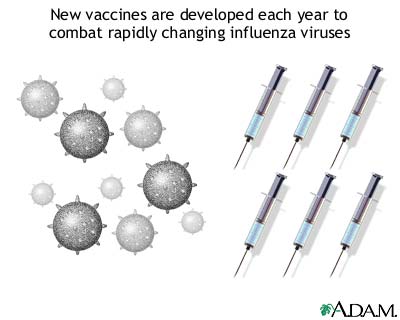
Hepatitis B virus (HBV) affects the liver. Those who are infected can become lifelong carriers of the virus and may develop long-term problems such as cirrhosis (liver disease) or cancer of the liver.
Immunization Schedule
Hepatitis B vaccine usually is given as a series of three injections. The first shot is often given to infants shortly after birth. If the mother of a newborn carries the hepatitis B virus in her blood, the infant needs to receive the first shot within 12 hours after birth, along with another shot (HBIG) to immediately provide protection against the virus. If a newborn's mother shows no evidence of HBV in her blood, the infant may receive the hepatitis B vaccine any time prior to leaving the hospital. It may also be delayed until the 1- or 2- month visit to your doctor.
If the first dose is given shortly after birth, the second shot is given at 1 to 2 months and the third at 6 to 18 months. For infants who don't receive the first shot until 1 to 2 months, the second shot is given at 3 to 4 months and the third at 6 to 18 months. In either case, the second and third shots are usually given in conjunction with other routine childhood immunizations.
Why the Vaccine Is Recommended
The hepatitis B vaccine usually creates long-term immunity. Infants who receive the HBV series should be protected from hepatitis B infection not only throughout their childhood but also into the adult years. Eliminating the risk of infection also decreases risk for cirrhosis of the liver, chronic liver disease, and liver cancer. Young adults and adolescents should also receive the vaccine if they did not as infants.
Possible Risks
Serious problems associated with receiving the HBV vaccine are rare. Problems that do occur tend to be minor, such as fever or redness or tenderness at the injection site.
When to Delay or Avoid Immunization
- if your child is currently sick, although simple colds or other minor illnesses should not prevent immunization
- if a severe allergic reaction (called anaphylaxis) occurred after a previous injection of the HBV vaccine
Caring for Your Child After Immunization
The vaccine may cause mild fever, and soreness and redness in the area where the shot was given. Depending on the age of your child, pain and fever may be treated with acetaminophen or ibuprofen. Very young infants should not be given either medication, but for older infants or children, you can check with the doctor about the appropriate dose.
When to Call the Doctor
- if you're not sure of the recommended schedule for the hepatitis B vaccine
- if you have concerns about your own HBV carrier state
- if moderate or serious adverse effects appear after your child has received an HBV injection


